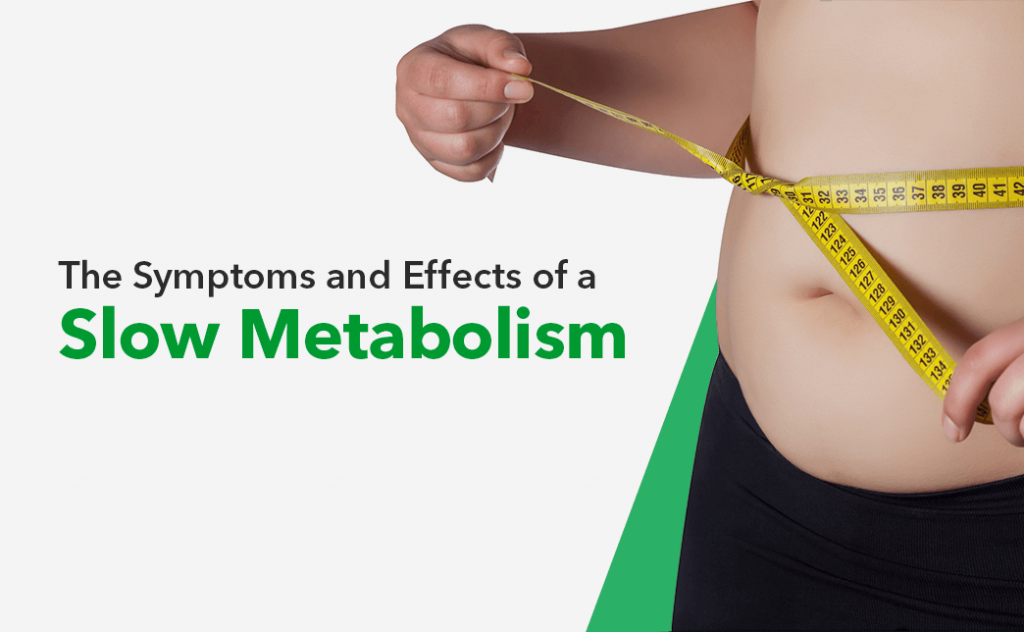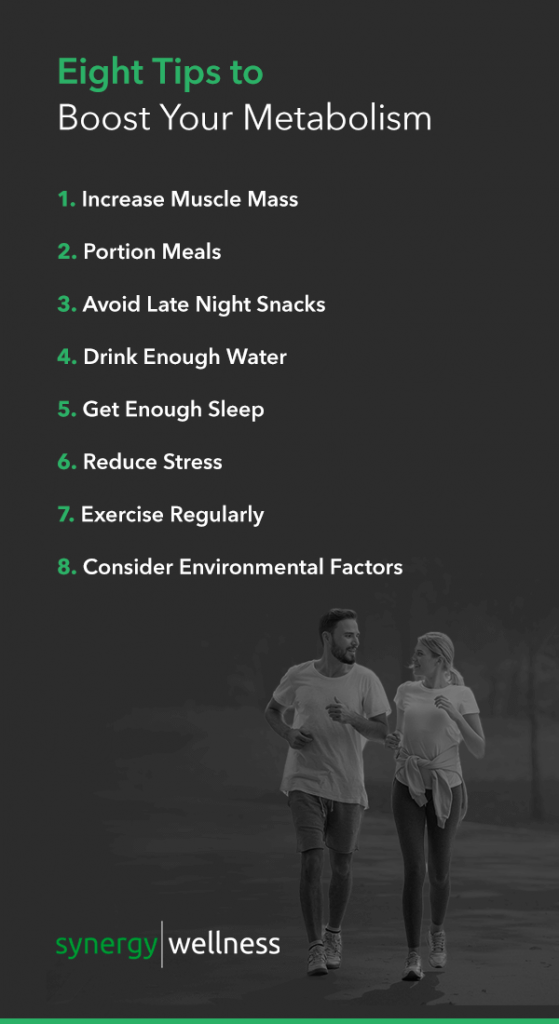
Your metabolism is your body’s process for converting the food you eat into energy. During the metabolic process, the calories of food and drinks are combined with oxygen to release the energy that your body needs to function. In general, a fast metabolism is more efficient at this process and can prevent the body from storing excess fat. Learn the symptoms and effects of slow metabolism as well as how to boost metabolism and lead a healthy lifestyle.
Contact Us for a Weight Loss Consultation
What Is Metabolic Rate?
Your metabolism is not a single process or mechanism in the body. Instead, your metabolism is a series of functions and chemical reactions that your body performs all the time. Metabolic rate is the speed at which your body performs these functions. The entire metabolic process converts food to energy for your body to use.
Basal Metabolic Rate
Your basal metabolic rate (BMR) is the number of calories your body needs to perform its most basic life-sustaining functions. Even as you are resting, your body burns calories as it performs functions such as breathing, nutrient processing, cell production and circulation. Knowing your BMR can help you achieve your weight loss goals. Understanding how many calories your body burns can help you determine how many you can consume. Your BMR is determined by numerous factors, including:
- Sex
- Height
- Weight
- Age
- Weight History
- Body Composition
- Genetic Factors
Resting Metabolic Rate
While your BMR is the minimum number of calories your body needs for basic functions at rest, your resting metabolic rate (RMR) is the total number of calories burnt while your body is resting. Many people use the terms basal metabolic rate and resting metabolic rate interchangeably, although they differ slightly. Despite this difference, your RMR can be used to help estimate your BMR.
Metabolic Age
Your metabolic age is your BMR, or the number of calories your body burns at rest, compared to the BMR of other people in your chronological age. Comparing your BMR to people of the same chronological age can help you determine if your metabolism is more or less effective than others in the general population.
What Causes a Slow Metabolism?
Numerous slow metabolism causes can impact your body’s ability to process food and cause weight gain. While slow metabolism symptoms vary, the most common symptom is excess fat being stored in the body and overall weight gain. Some of the most common causes of slow metabolism and weight gain include:
1. Cortisol
Cortisol plays a vital function in your body. It stimulates your carbohydrate and fat metabolism, which can give your body a spike in energy. While this function plays a critical role in survival situations, it also dramatically increases the appetite. Additionally, higher cortisol levels may cause you to crave sweet, salty or fatty foods, increasing the potential for weight gain.
2. Thyroid Conditions
The thyroid produces the thyroid hormone, which is essential to controlling many bodily activities, including how fast your heart beats and the speed at which you burn calories. Thyroid conditions like hypothyroidism can negatively impact hormone production and cause too much or too little of a hormone. You may feel restless or even tired, depending on how much of the hormone your body produces. Additionally, a thyroid imbalance can cause weight gain.
3. Insulin Levels
Weight gain is a common side effect for insulin patients because insulin is a hormone that regulates the cells’ ability to absorb sugar. When you take insulin, sugar can enter your cells, dropping the overall glucose levels in the blood. If you take in more calories than you need, your cells retain more glucose. If your cells do not use the glucose, it will be stored as excess fat.

4. Estrogen or Testosterone Levels
Hormone levels play an essential role in your metabolic age and how fast your metabolism is. Low estrogen or testosterone levels may slow the metabolism and lead to the body storing excess fat. Lower hormonal levels also lead to muscle loss, which leads to a higher body fat mass. Natural dips in hormone levels occur as we age, especially when women experience menopause. To prevent weight gain, leading a healthy lifestyle is essential.
5. Age
Age is a significant factor that may slow down your metabolism, resulting in weight gain. As we age, our bodies will experience various hormonal changes that may cause muscle tissue loss. Lean body mass burns more calories than fat can, even when at rest. As muscle tissue decreases with age, the body may become less effective at burning calories. Without proper strength training, many people may experience weight gain as they get older.
6. Medications
Certain medications can impact your metabolism, including long-term use of anti-inflammatory steroids, leading to an increase in appetite and calorie overconsumption. These medications are also associated with higher blood sugar levels, insulin resistance and additional fat storage. To offset the potential negative impacts of medications on your metabolism, you must exercise regularly and follow a nutritious diet.
7. Caloric Deficit
A caloric deficit is when your body burns more calories than it takes in, resulting in weight loss. If you cut your calories dramatically and suddenly, your metabolism may slow, preventing you from losing weight. Additionally, extreme calorie deficits are not sustainable and often contribute to frustration or binge eating, causing weight gain in the long run.
8 Symptoms of a Slow Metabolism
Your metabolism is an essential part of regulating various bodily functions, including energy level, the ability to lose or gain weight and regulating the body temperature. The health and efficiency of your metabolism directly impact your sense of wellbeing. While a metabolism slows naturally with age, numerous factors may cause metabolism to work more slowly. Fortunately, lifestyle changes and addressing underlying causes can help to speed up the metabolism.
1. Weight Gain
One of the most apparent signs of a slow metabolism is weight gain. Generally, your diet quality and level of exercise are some of the most critical factors in gaining weight. A slow metabolism can also contribute to weight gain. A less efficient metabolism slows calorie conversion, meaning you burn fewer calories. Using fewer calories causes your body to store additional fat.
2. Difficulty Losing Weight
Another common symptom of a slow metabolism is the inability to lose weight effectively. A slower metabolism can make it more challenging to lose weight because the body strives to conserve calories for energy. A slow metabolism burns fewer calories, making it more likely to keep weight on. Additionally, slower metabolism may make it difficult for people to lose weight even if they initiate positive changes to their diet and exercise routines.
3. Fatigue
Many people with a slower metabolism may experience chronic fatigue or feel lethargic. If your metabolism is slow, the process of breaking down food and turning the calories into energy levels will be slower. If this process slows, it will diminish your overall energy levels. If you have a slow metabolism, you may be unable to shake a sleepy, groggy feeling or find that you tire very easily. Research shows that changes in body composition and food intake may influence the perception of fatigue.
4. General Weakness
Your body requires a healthy immune system to prevent bacteria or germs from making you sick. Your immune system can be negatively impacted by slow metabolism and make you more vulnerable to getting sick or feeling weak in general. Additionally, you may experience joint or muscle stiffness, pain and weakness.

5. Dry Skin
Some people with a slow metabolism may experience dry, irritated skin prone to cracking. The hormones that control your body’s metabolic processes are the same hormones that aid in keeping your skin and nails healthy. A metabolic imbalance may reveal itself through skin irritation. Dry, itchy, flaky or oily skin may even be accompanied by paleness or irregular pigmentation.
6. Thinning Hair
The hair growth cycle requires proper nutrients to continue generating hair. If a slow metabolism affects your body’s intake of nutrients, your hair may not be able to grow as strong and healthy as before. While some people may experience hair thinning or a change in texture, others may notice their hair is duller than usual. Additionally, some may even experience more widespread hair loss.
7. Mood Swings
Mood swings are a common symptom related to a slow metabolism. Those with a slow metabolism may experience mood changes or be more prone to various emotions. In some cases, people with a slower metabolism may be more likely to experience depressive symptoms or anxiety. Depression or a negative mood may also lead some people to lead a less healthy lifestyle, further slowing the metabolism.
8. Inability to Concentrate
Another side effect of a slow metabolism may be difficulty concentrating or feeling forgetful. If your metabolism is not functioning correctly, you may experience short-term memory lapses or be more forgetful than usual. Focusing on tasks or important projects may also be more challenging for you. Without proper nutrition, your body cannot support various mental processes.
Eight Tips to Boost Your Metabolism

A slow metabolism can cause weight gain and make it difficult for people to lose weight. You can make numerous lifestyle changes that can promote a healthier metabolism and help you lose excess weight. While your metabolism is determined by various factors, including age and genetics, maintaining a healthy lifestyle and exercising can help. If you are looking to boost your metabolism, you may want to consider these eight tips.
1. Increase Muscle Mass
Those who have more body muscle often have higher metabolisms that work more efficiently. The body requires more energy to maintain muscle mass than it needs to maintain fat. Increasing muscle mass can boost your resting metabolic rate, meaning your body will burn more calories per day. Strength and weight training can improve overall health and stimulate metabolism.
2. Portion Meals
Portioning your meals can help you feel full and satisfied throughout the day and lower your cravings for unhealthy food. Eating small, well-portioned meals throughout the day can stimulate your metabolism and provide the necessary nutrients your body needs to function. Portioning meals can also help prevent you from overeating.
3. Avoid Late Night Snacks
Snacking late in the evening may lead you to overeat. Additionally, many people go to bed after a late-night snack. In that case, the body will not have as much time to burn these calories off.
4. Drink Enough Water
Water and proper hydration are vital to the metabolic process. If you do not drink enough water each day, your metabolism may slow. Consuming a healthy amount of water daily can provide proper hydration and increase your metabolism speed. Research indicates that a healthy level of water consumption is around 3.7 liters for men and 2.7 liters for women.
5. Get Enough Sleep
A proper sleep schedule is essential to a healthy lifestyle. Research suggests sleep deprivation can change the glucose metabolism and hormones that help regulate metabolism. Sleep is directly connected to our quality of life and various hormonal and metabolic processes. Those with an unhealthy sleep schedule may be more likely to experience cardiovascular and metabolic complications.
6. Reduce Stress
Chronic stress can cause people to experience intense cravings and lead to overconsumption of unhealthy foods. Stress can also slow the metabolism, leading to weight gain.
7. Exercise Regularly
Regular exercise is essential to leading a healthy lifestyle. A healthy exercise routine and strength training can increase your metabolic rate and daily energy expenditure. Adding lean body mass can help to improve insulin sensitivity and lower your overall risk of diabetes. Many health experts recommended high-intensity interval training and cardiovascular exercises.
8. Consider Environmental Factors
Certain environmental factors like chemical exposures can negatively impact your metabolism and slow your metabolic rate. Some of the most common chemicals that can affect your metabolism include antimicrobials, pesticides, plasticizers, parabens and flame retardants. These endocrine-disrupting chemicals may cause a hormonal imbalance that results in metabolic syndrome. Limiting exposure to these materials can help to lower the risk for these adverse reactions.
Seek Weight Loss Treatment Options at Our Premier Medical Wellness Center
Synergy Wellness Center is a medical wellness and rehabilitation center dedicated to providing medical weight loss solutions and cosmetic and age management services. We provide body shaping, weight loss, medical aesthetics and hormone therapies. Our team of experts is well-established and highly trained professionals who can perform various aesthetic treatments using laser and filler technology. Learn more about our weight loss programs in Bakersfield, Clovis, and Arizona.
We are a multidisciplinary wellness center that can help patients improve various symptoms related to weight gain, aging and appearance. With our team of highly motivated professionals, we provide individualized care and customized treatments to each patient to help them achieve their goals. We are proud to help our patients achieve the body they have always dreamt of.
Learn more about our services and contact us online or call (661) 878-9100.




